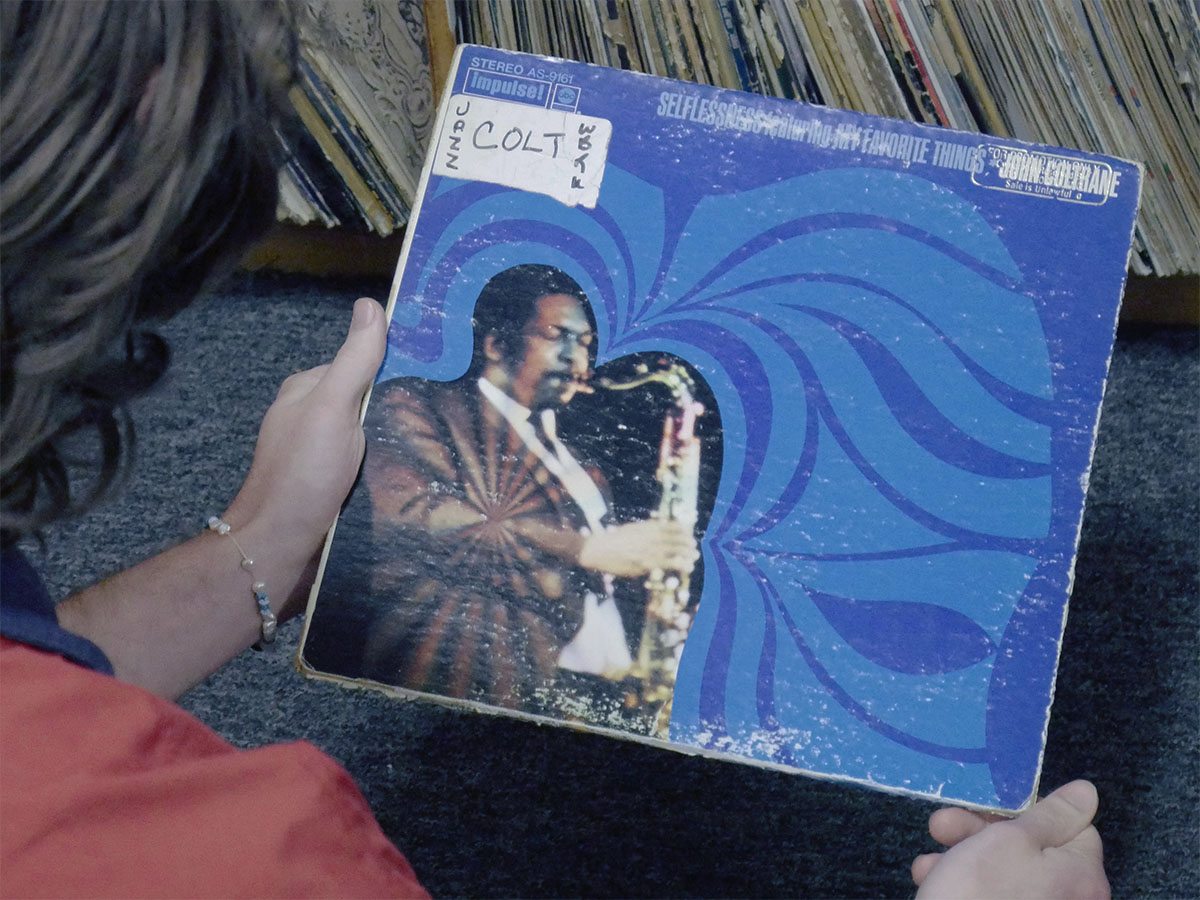A Lookback to John Coltrane’s Selflessness

Words: Ciaran Cahill
June 25 2021
With the historic Newport Jazz Festival fast approaching, I was delighted this week to find myself catching a glimpse of the event’s legendary past.
While rummaging through the WBRU’s record collection, I was struck by John Coltrane’s record Selflessness, featuring two live recordings from Newport Jazz ‘63 along with a 1965 studio session. The record jumped out at me from the shelf because I’ve recently been on a Coltrane deep dive and thought I’d at least heard the names of all his albums, even those I hadn't listened to yet. But Selflessness hadn’t crossed my radar, and its novelty factor skyrocketed by virtue of its wild, captivating cover art. The title itself was of a kind with the unabashedly serious/spiritual labels Coltrane gave to his later works (Ascension, A Love Supreme, etc.), but those records tended to come packaged in solemn portraits of a mystic, wide-eyed ‘Trane gazing into the Great Beyond. Selflessness, by contrast, boasts a hilariously half-hearted graphic scheme wherein lysergic good vibes emanate from a shakily-cropped photo of the hard-blowin’ sax man, himself striated in mind-expanding light as if he were in the party sequence in Midnight Cowboy.
A Google search revealed that Selflessness wasn’t a unit conceived by Coltrane but rather something of a vault dump by his label, Impulse!, released in 1969, two years after his death. Coltrane was an established jazz titan of the generation increasingly at odds with the iconoclastic tide rising first through jazz music and then through society at large. Bridging this divide, his full musical and spiritual engagement with the 1960s zeitgeist in the last years of his life lent both credence and fire to the burgeoning youth movement. Selflessness’ cheap psychedelic packaging shows how quickly his complex art, and the social movements which cohered around it, were simplified and subsumed into commercial product.
Be that as it may, the music on Selflessness transcends both 1960s idealism and its cynical declawing, finally standing as the timeless document of an unstoppable force’s progression through time. Side one of the record is an 18-minute rendition of Coltrane’s best-known tune, “My Favorite Things,” and what a rendition it is: whereas the classic 1961 studio version settles into an extended trancelike groove, the Newport ‘63 substitution of Roy Haynes on the drums for Elvin Jones (caught in traffic that day) blasts wide open the pearly gates of polyrhythm and sends the whole take careening with an energy to match the stylistic changes ‘Trane had undergone in the intervening two years. The bebop formula of rotating solos among the band is subjected here to a kind of internal demolition, wherein the horn’s long silence during McCoy Tyner’s relentless piano spotlight becomes an intentional and seismic experiment in scale, and the urgent wail of its eventual reentry tingles more spine than you might be comfortable with. The Grateful Dead’s live explorations over the next decade clearly spring from the groundwork laid down here.
On side two, “I Want to Talk About It” from the same Newport show doesn’t stretch out as far but remains simply lovely, concluding with a playful extended improvisation from Coltrane as all the other instruments drop away. The last and titular track, “Selflessness,” is an outtake from a studio session two years later, featuring Coltrane’s classic quartet augmented by Pharoah Sanders on second tenor and an additional bassist and percussionist. This 15-minute jam didn’t fully gel for me; late-period Coltrane unbelievers will find their accusations of formlessness and lack of direction confirmed here. I’m not one of them, but I do think there’s a reason ‘Trane left this one in the can––it never seems to accumulate the focus and intensity that mark his final brilliant quests into the limits of dissonance. It’s not bad music, it just feels like treading water. Maybe that’s fitting for this snapshot of an artist in transition, just before disbanding his classic quartet and reformulating a band more amenable to his evolving vision that would, from 1965 to his death at age 40 in ‘67, leave conventional music further and further behind.
Selflessness documents the evolution of both Coltrane’s art and his popular image, crystallized here at the high-water mark of commercial hippiedom in 1969. Time passing has distanced us from the cultural movements for which this music was put to work, but the molting of its social relevance at least allows us a refreshed encounter with pure sound.
Listen to Selflessness here︎︎︎
A Google search revealed that Selflessness wasn’t a unit conceived by Coltrane but rather something of a vault dump by his label, Impulse!, released in 1969, two years after his death. Coltrane was an established jazz titan of the generation increasingly at odds with the iconoclastic tide rising first through jazz music and then through society at large. Bridging this divide, his full musical and spiritual engagement with the 1960s zeitgeist in the last years of his life lent both credence and fire to the burgeoning youth movement. Selflessness’ cheap psychedelic packaging shows how quickly his complex art, and the social movements which cohered around it, were simplified and subsumed into commercial product.
Be that as it may, the music on Selflessness transcends both 1960s idealism and its cynical declawing, finally standing as the timeless document of an unstoppable force’s progression through time. Side one of the record is an 18-minute rendition of Coltrane’s best-known tune, “My Favorite Things,” and what a rendition it is: whereas the classic 1961 studio version settles into an extended trancelike groove, the Newport ‘63 substitution of Roy Haynes on the drums for Elvin Jones (caught in traffic that day) blasts wide open the pearly gates of polyrhythm and sends the whole take careening with an energy to match the stylistic changes ‘Trane had undergone in the intervening two years. The bebop formula of rotating solos among the band is subjected here to a kind of internal demolition, wherein the horn’s long silence during McCoy Tyner’s relentless piano spotlight becomes an intentional and seismic experiment in scale, and the urgent wail of its eventual reentry tingles more spine than you might be comfortable with. The Grateful Dead’s live explorations over the next decade clearly spring from the groundwork laid down here.
On side two, “I Want to Talk About It” from the same Newport show doesn’t stretch out as far but remains simply lovely, concluding with a playful extended improvisation from Coltrane as all the other instruments drop away. The last and titular track, “Selflessness,” is an outtake from a studio session two years later, featuring Coltrane’s classic quartet augmented by Pharoah Sanders on second tenor and an additional bassist and percussionist. This 15-minute jam didn’t fully gel for me; late-period Coltrane unbelievers will find their accusations of formlessness and lack of direction confirmed here. I’m not one of them, but I do think there’s a reason ‘Trane left this one in the can––it never seems to accumulate the focus and intensity that mark his final brilliant quests into the limits of dissonance. It’s not bad music, it just feels like treading water. Maybe that’s fitting for this snapshot of an artist in transition, just before disbanding his classic quartet and reformulating a band more amenable to his evolving vision that would, from 1965 to his death at age 40 in ‘67, leave conventional music further and further behind.
Selflessness documents the evolution of both Coltrane’s art and his popular image, crystallized here at the high-water mark of commercial hippiedom in 1969. Time passing has distanced us from the cultural movements for which this music was put to work, but the molting of its social relevance at least allows us a refreshed encounter with pure sound.
Listen to Selflessness here︎︎︎
